This Wednesday it will be two years since our lives changed and words like lockdown and curfew became part of everyday lives
March 9 marks two years since Cyprus confirmed its first Covid-19 infection, a date which two years later virtually to the day will see a fresh round of changes to the restrictions.
In those two years, there has been a dizzying array of measures, not least the on and off lockdowns, which led to many feeling a disorientating effect of ‘pandemic time distortion’ – or a series of endless Blursdays.
Here we take a look at the key dates in the pandemic.
Cyprus’ first confirmed infections were reported on March 9, 2020, when a 64-year-old heart surgeon tested positive following his arrival home from Britain on March 3. He was not tested until March 8. The other was a 25-year-old Limassol man who had visited northern Italy – then the epicentre of the outbreak in Europe.
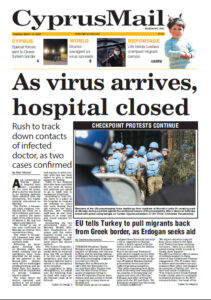
Front page of the Cyprus Mail March 10, 2020
Schools closed on March 13, initially set to last for just a week – only two days after the World Health Organisation declared the Covid-19 outbreak a pandemic. They remained closed for the rest of the academic year.
Cyprus reported its first Covid-19 death on March 21– a person who had underlying health conditions, described elsewhere as a “severe medical history”.
Also on March 21, the government banned passenger flights – initially for a two-week period – effectively denying the vast majority of those overseas the right to return. This ultimately led to students being banned from returning home for Easter the following month. In an effort to sweeten the blow, the government allocated €750 for each student stuck abroad. Lawyers slammed the travel ban as unconstitutional.
Just two days later, on March 23, a general lockdown was announced, initially set to last from March 24 until April 13 but later extended until May 21.
On March 24 Cyprus was introduced to the “SMS system” – or the 8998, which many have now expunged from their memory. The government announced that non-essential outdoor trips were banned and one could only leave their house if they filled out a form or sent an SMS. During its initial phase, there was no limit to the number of SMS permissions which could be granted although this was later set to once a day. At various points over the last two years it fluctuated from one to three outings per day (each valid for a ‘reasonable amount of time’).
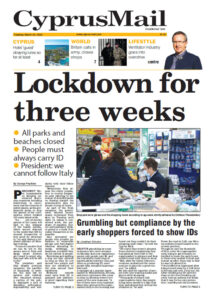
Front page of the Cyprus Mail, March 24, 2020
In a televised address to the nation on March 23, President Nicos Anastasiades said: “I cannot conceive that we can be led to the scenes seen in Italy and Spain where doctors are forced to select who lives and who will be left to die.”
A curfew from 9pm-6am was in force while on March 26 a bill was passed imposing fines of €150 on those violating the measures. On March 30, the fines were doubled to €300.
Total reported infections once the lockdown ended in May were at 922. On May 29, then leading government pandemic advisor Leontios Kostrikis said that there will be no second wave of Covid-19. He reasoned that Covid-19 “doesn’t seem to be like influenza which comes in waves”.
By late July 2020, restrictions made a return, as on July 31mask mandates were imposed indoors after a series of days of double digit infections, following days without any confirmed infections.
But after such a series of harsh and unprecedented measures, the summer of 2020 appeared a breeze in comparison: Cyprus had escaped the worst of the pandemic, unlike fellow European countries such as Italy and Britain, with many hailing the low death count.
By October, the infections returned, particularly in Limassol and Paphos where on the 22nd a 11pm-5am curfew was imposed in Limassol and Paphos. A mask mandate was also extended to all outdoor areas.
On November 12, Limassol and Paphos were sealed off from the rest of the island. Police and the military were on the highways ensuring travel to and from those districts was almost entirely cut off. Huge queues formed in the following days, with traffic jams leading up to the roadblocks and Covid-19 test sites as people entering the districts were required to provide proof of a negative test.
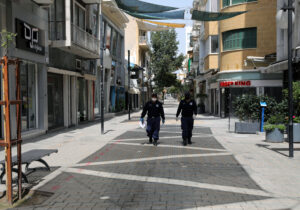
Police patrolling Ledra street in Nicosia in March 2020
On November 27, a partial lockdown was announced lasting from November 30 until December 13. It was later announced that Christmas would take a hit and bars, restaurants and other such venues would close from December 11-31.
The first Covid-19 vaccinations took place on December 27 after Pfizer jabs were delivered. Anastasiades got vaccinated on December 28.
On January 8, 2021 stricter measures were announced – such as the return of the SMS system, two outings per day – but this was later beefed up to a full lockdown just two days later on January 10, which was set to last until January 31. It wasn’t until March 12 that the announcement came permitting some relaxations, such as outdoor dining from March 16. Notably however, primary schools in Limassol remained closed while bars and cafes were operational.
“So I can take my child to a café, or he can sit with his friends without fear of transmitting the virus, but going to school, where protocols are kept, masks are worn and tests are performed is more dangerous?” a parent complained at the time.
March 16 also saw the health ministry announcing a ban on music which would “entice people to dance” and that patrons would have to wear their masks between taking bites of food. These two measures were dropped later in the day following widespread ridicule and backlash.
On March 31, it was announced that people could leave their house three times per day during the weekends.
On April 19 a government advisor confirmed that a person’s underlying health conditions would no longer be announced by the health ministry when reporting on Covid-19 deaths.
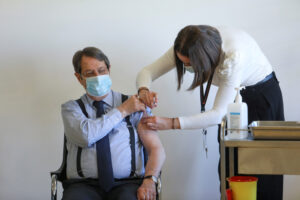
President Anastasiades was among the first be vaccinated on December 28, 2020
With fears of the spread of the Delta variant which was sweeping through the UK, on April 23, a “short, sharp” lockdown was announced – lasting from April 26 to May 9, including Easter on May 2. The SMS system was brought back (one outing per day) as was the 9pm-5am curfew.
On May 10, the SMS system was dropped but the SafePass was brought in as former Health Minister Cosntantinos Ioannou said that “the SafePass… will allow people to move around without the psychological pressure of having to send an SMS” while the curfew was extended to 11pm.
Notably, it was said at the time that only the police or other government officials will be able to stop members of the public and ask for the SafePass – with those working in shops, restaurants and other places where it is needed not being responsible for checking people have one. This later changed with staff being forced to check SafePasses.
The curfew was scrapped on June 10.
The emergence of the highly contagious Omicron variant in late November heralded another wave of infections, surpassing by hundreds of infections a day the original Wuhan cases.
From November 29, the mask mandates were extended to children aged six and above while the six to 11 age groups was also inducted into the SafePass requirements. The unvaccinated were also banned from most areas, such as cafes, bars and restaurants.
December saw a surge in reported infections, soaring from 883 on December 22 to over 3,000 (along with five deaths) just a week later on December 29.
On January 4 the health ministry announced a record 5,024 infections.
January was the deadliest month since the outbreak in Cyprus, with 96 deaths attributed to Covid-19.
On February 15 it was announced that the unvaccinated were to be allowed back into public life, as the ban on their entry to cafes, bars, restaurants and most other venues was lifted.
A week later, on February 21, the government allowed dancing in nightclubs provided everyone has a recent negative rapid test.
And two years on from Cyprus’ first confirmed Covid-19 infection, on March 8, the SafePass will be axed from supermarkets, kiosks and bakeries.

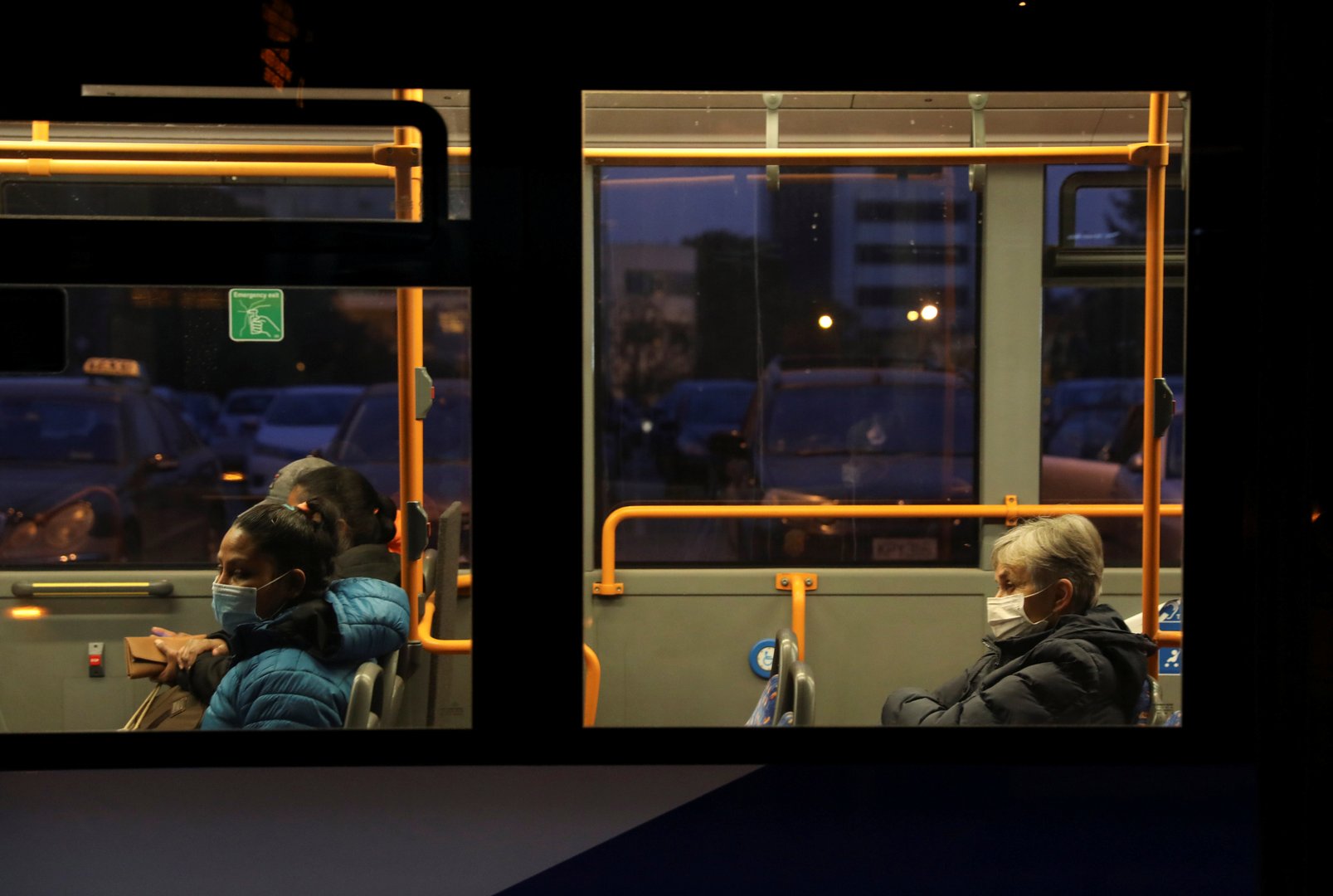





Click here to change your cookie preferences